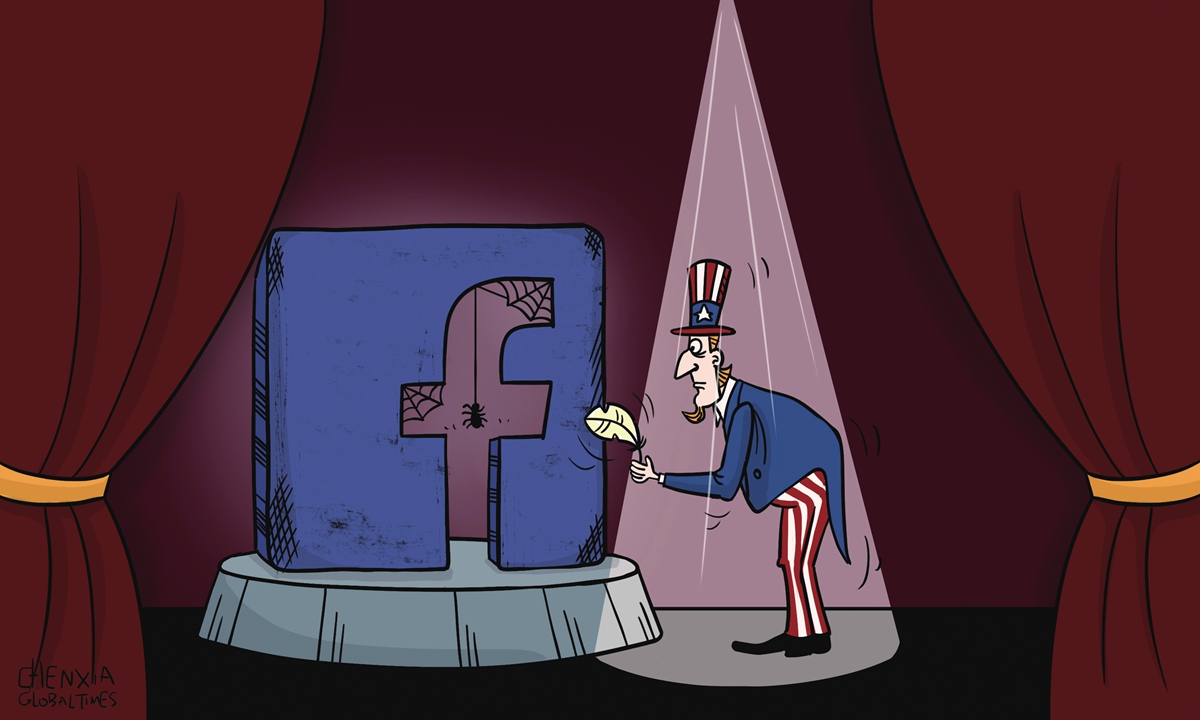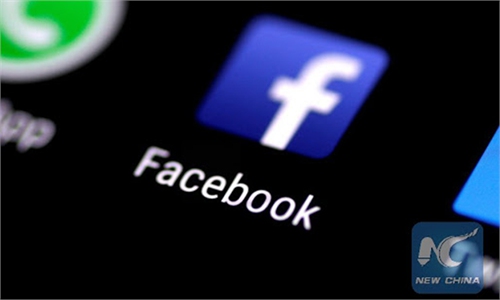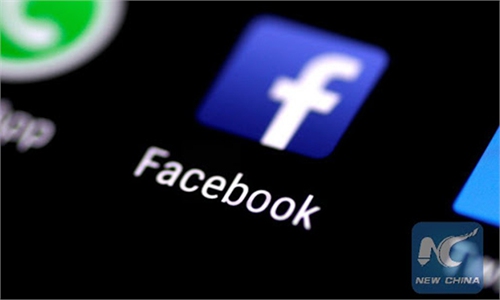US governance on Facebook a selective political stunt for establishment to vent anger

Facebook Illustration: Chen Xia/GT
US tech giant Facebook, now renamed "Meta," recently ran into trouble. Frances Haugen, a former Facebook data scientist, testified before the US Congress that Facebook's products, "harm children, stoke division and weaken our democracy."
US media National Public Radio reports that there are four key points in Haugen's testimony. First, she is a former Facebook employee who worked for two years as a data scientist. She copied thousands of pages of Facebook confidential documents before leaving the company. Second, Instagram, owned by Facebook, may have coveted young users, despite health concerns. Third, both the Democrats and the Republicans in Congress are united on regulating Facebook. And fourth, Haugen claims that Facebook broke the law by lying to investors. This involves the January 6 Capitol Riot, how effective it is as removing hate speech, and how it makes body image issues worse.
Some observers tend to consider the regulation on Facebook as an important change in internet content governance in the US. However, this is more likely to be another political show with selective regulation.
Facebook has once again become the target of a particular coalition of the domestic US establishment and the left-wing liberals to vent their frustrations caused by the rapid growth of populism since 2016. At that time (when the Democratic Party lost the election), Facebook was accused of being used by Russia to have interfered in US election and was sued for failing to protect users' personal data in the Cambridge Analytica breach.
This time, a data scientist joined the campaign. This has made the allegations against the tech company far more penetrating. However, from the perspective of cyberspace governance, this political investigation on Facebook is based on two proven misperceptions.
First, the current accusations are pinning the core of the problem on algorithm, rather than exploring and reflecting real issues in the society.
Be it body image anxiety or hate speech, the role Facebook algorithms can play is, at best, to worsen the situation rather than cause it from scratch. And to manage these problems, what is needed is to build a comprehensive governance system both online and offline. For those who are familiar with the rules of the US domestic political game, only targeting the Facebook algorithm is actually a politicized move. It is not at all effective governance to solve real problems.
Second, the political and moral condemnations against Facebook became a main channel to vent the frustrations of the establishment. It will distract the negative feelings from its inability to respond to US' deep political, social and economic contradictions.
Since Donald Trump's "surprise" victory in the 2016 presidential election, many US colleges have pressed the pause button. Students and teachers were offered counseling services. Hate speeches and hate crimes have increased. Those are only issues on the surface. The deep reason lies in the defects of America's political, social and economic system and the outbreaks of the country's deep rooted contradictions. A same problem happened after the 2020 election, with the Capitol Hill riot a prime example. But it is clear that the establishment is more willing to find an excuse and a convenient scapegoat as well. Blaming Facebook is in line with this need to deflect. Haugen, as an "insider," "data expert" and "former Facebook employee," drew intense attention from Congress and the media when "revealing" the company's history. While much of the evidence may not necessarily be able to prove the allegations legally, it has triggered enough political and public opinion resonance.
Facebook is of course not entirely innocent. But the essence of Facebook's issue lies in the monopoly created by this super-platform, its abuse of its monopoly, and the lack of effective policy tools for US authorities to deal with the super-media platform incubated by digital financial capitalism.
Around 2010, Hillary Clinton, then secretary of state and later Democratic presidential candidate, firmly believed that platforms such as Facebook, Twitter and YouTube could become tools of US' foreign policy. When former president Bill Clinton sought to use social media to promote regime change in other countries, the flaws that Haugen exposed were already in existence. But at the time, those problems were affecting "other countries," or US "strategic adversaries." So, there was no need to regulate Facebook. Instead, it needed to be regarded as a tool in US foreign policy. It was only in 2016 and later years - after the boomerang had hit the American establishment itself - that the issues about the company became problematic. It is clear that this is not about governance in the usual sense. It only shows the selectivity side of US politics.
Based on the experience of emerging countries represented by China, the impact and challenges brought by the internet require them to build and improve the relevant governance capacity and system. The US has now recognized the existence of problems. Yet the way it deals with them reveals US' extreme egocentrism. And even if Facebook eventually has to face substantial punishment in the legal process, it will still be a US-style political show. This does not fundamentally solve the country's problem of how to effectively govern cyberspace.
The author is director at the Research Center for Cyberspace Governance, Fudan University. opinion@globaltimes.com.cn


